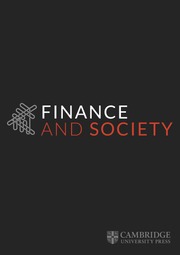Article contents
The everyday construction of value: A Canadian investment fund, Chilean water infrastructure, and financial subordination
Published online by Cambridge University Press: 09 November 2023
Abstract
Infrastructure in several economies in the Global South has rapidly undergone financialization, aided and abetted by governments opening-up their infrastructure assets to global institutional investors in search of stable, predictable revenue streams. This account of financialization could be the end of the story were it not for the fact that Christophers (2015) and others have shown that institutional investors are not simply in the game of ‘finding’ value or ‘harvesting it’ from obliging states, rather they actively construct it. What often catches the eye, however, are the more overt forms of financial engineering (Ashton et al., 2012), whereas what tends to go unnoticed are the ways in which infrastructure assets are routinely ‘worked’ to generate value over time. Here, we draw attention to a slower-paced financialization of infrastructure assets where, following Chiapello (2015, 2020), investors are engaged in a continual process of evaluation and revaluation of their assets to add value over and above prevailing benchmarks. Taking the example of Canada's Ontario Teachers’ Pension Plan (OTPP) and its extensive investments in Chilean water infrastructure, this article considers how a global investment fund draws on financial practices developed in the advanced economies to add value to long term infrastructure assets in the Global South. Such practices, we argue, enact a routine form of financial subordination which does not match the familiar image of wholly subservient and dominated dependent economies. Rather, the power asymmetries involved equate less to a zero-sum game and more to a game where the benefits are unequally shared between asset managers in the Global North and states in the Global South, where effectively the latter cooperate in their own submission in ways that are not always acknowledged as such.
- Type
- Article
- Information
- Creative Commons
- This is an Open Access article, distributed under the terms of the Creative Commons Attribution-NonCommercial-No Derivatives licence (http://creativecommons.org/licenses/by-nc-nd/4.0/), which permits noncommercial re-use, distribution, and reproduction in any medium, provided the original work is unaltered and is properly cited. The written permission of Cambridge University Press must be obtained for commercial re-use or in order to create a derivative work.
- Copyright
- © 2022 The Author(s)
References
- 4
- Cited by


